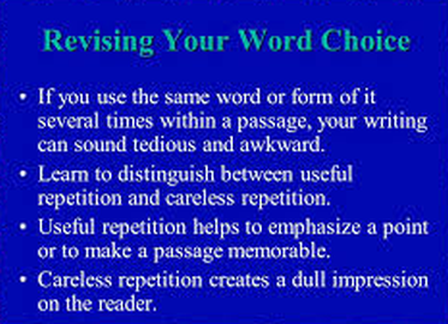Strategies for avoiding tedious repetition of the same words(Second of a 3-part series)This is the second of a three-part series on how to get rid of the repetitive and abstruse stock phrases that seep into our own English after repeated exposure to bureaucratese, legalese, and academese—phrases that soon make us sound like petty bureaucrats, lawyers, and academicians ourselves. The third and concluding part will come out on February 16.WHICH WORD TO USE AND IS IT DESIRABLE TO USE IT AGAIN?
Let me pick up where I left off last time. I was saying that among the content words, nouns are the most amenable to substitution with other words as a strategy for avoiding tedious repetition. For that purpose, of course, we routinely use pronouns for subsequent mentions of subjects identified by name—“he” or “she” for singular proper names and “they” for one or more of them, and “it” for singular things and concepts and also “they” for one or more of them.
In feature writing and in the more creative forms of expression, however, we can be more liberal by using synonyms or similar words for subsequent mentions of particular nouns. Those synonyms can focus on particular or specific attributes of the subject or key word, thus giving the reader or listener more information about them. We can do this without going into digressions that might just unnecessarily impede the flow of the exposition.
For example, the subject or key word “John Updike” might be later referred to in an exposition generically as “the writer” or more specifically as “a writer of sex-suffused fiction,” “a notable literary realist,” “the prolific American novelist and short-story writer,” “the two-time Pulitzer Prize-winning novelist,” and “America’s last true man of letters.” Indeed, by using a synonym or some brief descriptive detail, each subsequent mention of the subject becomes an opportunity for throwing new light on it for the reader’s or listener’s benefit.
As parts of speech in English, verbs, adjectives, and adverbs each have a unique and distinctive meaning or sense. In the case of verbs, there’s a specific verb for every kind of action; for instance, while there are close similarities between “walk,” “stroll,” “saunter,” “amble,” and “jog,” they are by no means perfectly synonymous. Thus, once you have used the verb “walk” the first time around for the action you are describing, it won’t be appropriate or advisable—just for the sake of avoiding repetition—to refer to that action as “stroll” the second time around, “saunter” the third time, “amble” the fourth time, “jog” the fifth time, and so on and so forth. For accuracy and authenticity’s sake, you’ve got to stick to “walk” in all subsequent mentions of that action you described as “walk” at the start.

This strategy should also be applicable to adjectives and adverbs. For instance, you’d be out of line describing a woman as “beautiful” the first time around, then describing her as “pretty,” “comely,” and “fair” in subsequent mentions; you’ve got to stick to “beautiful” or else not use that adjective again in the exposition. The same strategy would also apply to adverbs; once you have described the manner an action is done as “cruelly,” you can’t refer to that same manner as “fiercely” in a subsequent mention. In fact, it is good language policy to avoid repeat usage of adverbs (particularly those than end in “-ly”) or use their synonyms later in an exposition.
Now let’s take up what you describe as your reluctance to use one word more than two times in the same writing and, in particular, your being tempted to sometimes alternate the preposition “about” with such unpleasant bureaucratic phrases as “with regard to,” “with reference to,” “as regards.” Of course it’s a good general approach to avoid using the same word or phrase more than two times in the same exposition, but strategically, I think it’s not advisable at all to alternate “about” with such phrases as “with regard to,” “with reference to,” “as regards” in subsequent parts of the same exposition.
As you yourself have pointed out, these phrases indeed can eliminate repetition in your prose, but they will definitely make your prose sound standoffish. They will thus just get in the way of clear communication, so it will be like jumping from the frying pan to the fire, so to speak.
(Next:
Strategies for avoiding tedious repetition - III) February 16, 2018
This essay, 848th in the series, first appeared in Jose A. Carillo’s weekly “English Plain and Simple” column in the July 6, 2013 issue of The Manila Times
, © 2013 by the Manila Times Publishing Corp. All rights reserved.